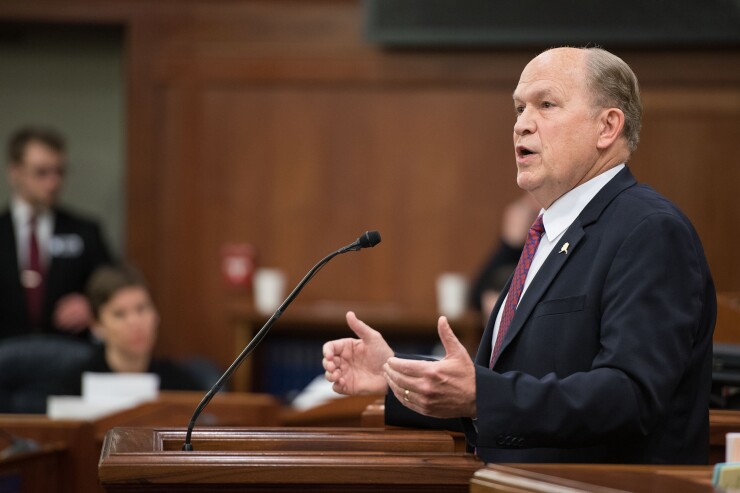As Alaska seeks to improve its financial standing it is turning to bonds to pay off $1 billion of tax credits it owes to oil and gas producers.
But the state – which faced controversy for using the subject-to-appropriation clause to walk away from a lease obligation for a state office building – faces a constitutional challenge before it can go to the market.

State officials are seeking dismissal of a lawsuit claiming that the plan violates the Alaska constitution’s limits on new debt.
Gov. Bill Walker, who signed a bill approving the program last month, says it will reduce the state’s deficit while encouraging oil producers to invest in the state.
“The policy change will save state government money in the long run, immediately provides small, independent oil and gas companies cash to invest, and keeps good on the state’s past promise to incentivize industry investment in Alaska and exploration for new oil,” according to a press release from his office.
Under the plan, producers who hold state tax credits for oil and gas exploration will get paid early in exchange for a 10% discount that the Walker administration says will pay for the bonding costs.
The bonds will be sold through a newly created Alaska Tax Credit Certificate Bond Corp. The bonds are subject to appropriation – relying on the legislature budgeting money every year to pay the debt service.
This isn’t Alaska’s first use of subject-to-appropriation bonds.
The state currently has $237 million in outstanding subject-to-appropriation bonds that are paying off a state prison in Goose Creek and a residential housing facility for Alaskan native tribes, according to an
Alaska has used such bonds for almost 70 years for projects such as acquiring public buildings for lease to the state government, Deven Mitchell, the state’s debt manager, stated in the memo.
He said such bonds are typically rated a notch below the state's bond rating but said any concern about their marketability is “misplaced.”
“In short, Subject to Appropriation bonds carry specific ratings in the Municipal bond market, are a well understood and commonly used financing tool, and will be highly rated based on the state of Alaska’s credit,” Mitchell said.

The state would face the same negative impacts for failing to appropriate funds to pay off the bonds as it would for not paying off general budget obligations for public safety, pensions and other programs, he said.
Two years ago, the Alaska legislature cited the subject-to-appropriation clause when it broke its lease for a Legislative Information Office in downtown Anchorage.
The six-story building was renovated to meet the specifications of the state agency, which occupied it in 2014. Amid finger-pointing over the cost of the 10-year, $33 million lease, state officials walked away from the lease and the building two years later, leaving the developers empty-handed after remodeling the building.
The building developers sued the state but a
The state’s decision to break its contract worried the Alaska Bankers Association at the time;
“Using the subject-to-appropriation clause, given the circumstances the state was in at the time, for us it had negative implications,” said Mike Martin, secretary-treasurer of the association and chief operating officer of Northrim Bank.
The association’s view was that “once the state makes a promise it has an obligation it should honor,” Martin said.
Martin sees the issue of the legislative building, which he described as a “political football,” as a unique situation and doesn’t believe the state would do the same with bonds issued for the oil and gas tax credit program.
The group supports the oil and gas tax credit program as one of two major steps taken by the legislature this year to create a sustainable budget going forward. The other was a bill in which the state will annually draw 5.25% from the Permanent Fund – a pool of oil and gas tax revenues invested over the years – to reduce its deficit.
“I think it just creates a whole lot more stable environment,” Martin said.
Opponents of the plan question whether it will result in savings and say it violates the Alaska constitution, which only allows for state debt to be incurred for capital improvement project or housing loans for veterans programs following voter approval.
Eric Forrer, a former University of Alaska regent and a retired contractor,
“We’re now converting a very soft obligation into a hard-edged debt,” said his attorney, Joe Geldhof.
An April
“They’re converting it from something that’s purely discretionary to something if we don’t pay it impacts our credit rating,” said Alaska state Sen. Bill Wielechowski, D-Anchorage, who asked for the legal review. “I would argue it puts the state into a much more detrimental position and could limit our ability to bond for future things.”
Attorney General Jahna Lindemuth wrote a May 2
The proposed bonds would not be considered debt because they would be “subject entirely to the legislature’s discretion to appropriate funds for that purpose, and the bonds give bondholders no recourse against the state,” the opinion states.
Wielechowski said there’s no question – even among those who oppose the plan like himself – that if the state issues bonds the legislature will appropriate money to pay them off.
“We have to pay our debt,” he said.
According to the state Department of Revenue, a bond issue of between $683 million to $738 million would be sold in August followed by an deal from $130 million to $180 million sometime between August 2019 and August 2021.
Under that plan, the state will only pay interest on the debt for the first two years followed by increased debt service that would eventually decline to flat payments in the final five years of the 10-year schedule.
That plan reduces the cost of oil and gas tax credits from 8.1% of the general fund budget to 1.1% and results in more predictable and level annual payments, the agency stated.
Timothy Little, an analyst with S&P Global Ratings, said the rating agency doesn’t see the oil and tax credit bond as a significant credit factor although “it does provide certainty going forward of how those liabilities would be funded.”
In June, the rating agency
Most appropriation bonds are ranked a notch below the agency’s general obligation ratings, Little said.
“In general, when there is a requirement for the legislative body to make an appropriation we do factor into our assessment the willingness” to fund it, Little said.
But that willingness is “not always easy to quantify up front,” he said.





